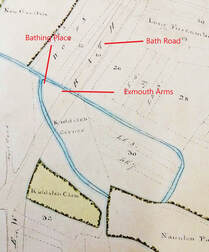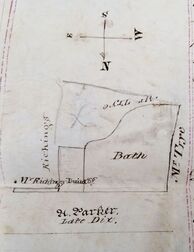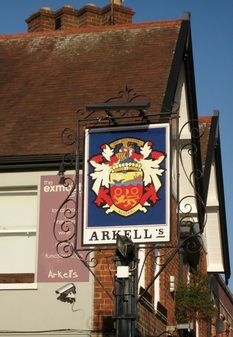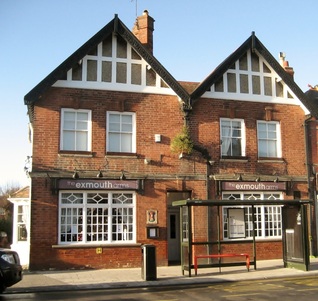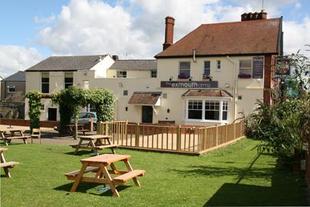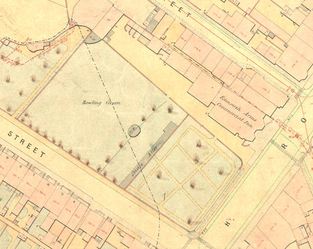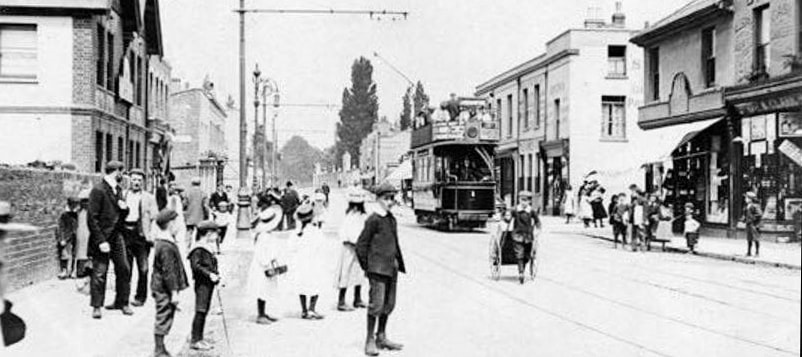Bath Road │34 previous / next │main map / bath road map
167 Bath Road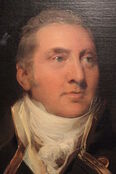 Sir Edward Pellew by Thomas Lawrence Sir Edward Pellew by Thomas Lawrence
The Exmouth Arms is named after British naval hero, Edward Pellew (1757-1833), who was created 1st Viscount Exmouth in 1816 and came to Cheltenham that autumn to recuperate from his expedition to Algiers to suppress the notorious barbary pirates. He had fought for Britain in the American War of Independence, the French Revolutionary Wars and the Napoleonic Wars.
The first recorded owners in 1821 were John and Ann Ritchings. They were subscribers to the Cheltenham Guardian Society, which existed from 1829 until 1864. This gave them support in finding and prosecuting offenders who committed thefts or property damage. The society employed a solicitor to carry out the prosecutions and issued ‘wanted’ posters offering rewards for information. John died in June 1838, at the age of 51, but Ann continued to run the pub until at least 1845. The Inn had been built on land that was part of a field called Kidditch Corner and it is believed to be one of the first properties in the Upper Bath Road, dating from before July 1819. In that month it was the venue for an auction of barley and oats growing in a nearby 20 acre field. The surrounding area would have had a semi-rural appearance, although the southward urban expansion of Cheltenham would soon change this. The Exmouth Arms briefly represented the gateway into town from the south. In 1820 a public swimming pool, known as Parker's Swimming and Bathing Place, was created adjacent to the west end of the Exmouth Arms garden. Fed by the Westal Brook, which now flows in a culvert under the site, and the Nolty Brook, it was owned by a local builder named Arthur Parker, who married in Cheltenham in 1811 and who was extensively involved in the development of South Town and The Park district.
 Cheltenham Chronicle 14 June 1821 Cheltenham Chronicle 14 June 1821
The pool survived his bankruptcy in 1820 and existed until about 1831 but is not shown on Merrett's map of 1834. In 1831 Arthur Parker was using the business address 'Cheltenham Swimming and Bathing Place, Bath Road'. Later that year he established himself as an estate agent with offices in the Promenade.
As is to be expected, over the last two hundred years there have been many landlords. From 1852-61 the landlord was Mr Henry Leach, who died of an epileptic convulsion aged just 36.
In 1870 Joseph Wood took over the licence of the Exmouth Arms. Although he was married, he had no children of his own but had nine nephews and nieces. By 1887 Joseph's health had deteriorated and his doctor suggested he retire to Malvern, where he died on 11th May 1890 from ‘softening of the brain’. He was succeeded that year as landlord by his nephew, James Kitching, who had already taken over the running of the pub with the assistance of barmaid Emily Parry, one of Joseph Wood’s nieces. 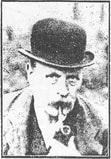 James Kitching James Kitching
In 1891 James Kitching contested his uncle Joseph Wood's will on the grounds that in an earlier will, written in 1886, the Exmouth Arms had been left to him entirely, whilst in 1887 a further will divided the estate between all of the nephews and nieces. James was able to prove that Joseph's state of mind was unsound at the time of writing the second will and so the Exmouth Arms, valued at £1,300, came to him. Later in 1891 James Kitching married his cousin Emily Parry and they had a son the following year. The Exmouth’s licence was for an alehouse, beer being brewed on the premises until around the time of the First World War.
James was a popular landlord, well known throughout Gloucestershire for his enthusiasm and love for bowling. He was instrumental in forming the Exmouth Bowling Club, of which he was a keen player and treasurer. The bowling green at the rear of the pub had already existed from before 1855 and was considered one of the best in the county. The reason that the pub has a late Victorian appearance is that James Kitching had the front rebuilt in 1898, concealing its earlier Regency origins. Although his reason for doing this isn't known, it was certainly a dramatic change, as can be seen from the photograph below. Bowler-hatted James can be recognised standing in front of the main door. The photograph was discovered in a cupboard in the pub in the 1980s and has been restored from the badly-damaged original.
 William Woodhouse William Woodhouse
In February 1922 James fell ill with peritonitis and died a few days later in hospital. After his death the licence was transferred to Emily and their son James but she decided to retire a year or so later. At around this time the Original Brewing Company took over the pub, which they re-opened in 1923.
The licence was transferred to Mr William John Woodhouse, who was born in Cheltenham and spent some of his early years living near to the Bath Road. He was a Cheltenham Town Crier and he died in 1948 at the age of 78. 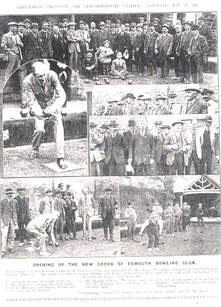 1923 1923
In 1923 the 'Cheltenham Chronicle and Gloucester Graphic' carried pictures of the re-opening of the Exmouth Bowling Club by Mr Hopcraft, General Manager of the Cheltenham Original Brewery. The green had been enlarged and ditches and banks made. Later editions of the newspapers carried articles about the green re-opening each season, until during the Second World War it was 'dug for Victory' to grow vegetables. After the War part of the green space was turned into a pub garden and used for fetes and other public events. Today the old bowling green is used as allotments to grow food and the front garden often hosts musical performances.
 Gerald & Mary Beachus, c.1968 Gerald & Mary Beachus, c.1968
Some of the other landlords over the last 60 years have included Messrs Robins, England, Godwin, Smith, Ratcliffe and Lerwill. From the 1960s to the 1980s the landlords were Gerald and Mary Beachus.
Researchers: Stuart Manton, Marilyn West & Eileen Allen (July 2024) |
For more information click here.
The map below shows the Exmouth Arms bowling green in the mid 1850s. This is now an allotment for growing fruit and vegetables. The adjacent garden remains very popular with customers. Sadly the skittle alley no longer exists.
|
If you have any further information or photographs of this property please let us know via the contacts page.
